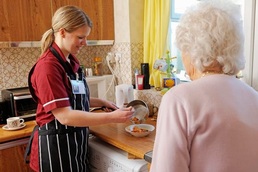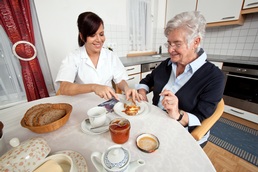All healthcare assistants will have to undergo basic training, according to Compassion and Care report
A new independent report published today has revealed plans to ensure that all frontline healthcare assistants undergo the same basic training before being able to work unsupervised.

The report showed that there is no universal minimum training standard for healthcare assistants which has led to a disjointed level of care being provided.
The review has been carried out in the wake of the Francis enquiry into Mid-Staffordshire NHS Foundation Trust where many older people experienced extreme cases or poor care and neglect due to the failings of care staff at the Trust.
Camilla Cavendish, author of the review, said: “There are more care assistants than nurses working in England. Many of us will rely on them at some point in our lives, in particular in old age, and we need them to be as good as they can possibly be – especially as some support workers are carrying out procedures which used to be done by nurses, even doctors.
“I have seen many examples of excellent and skilled care, but I have been struck by how disconnected the systems are. The airline industry figured out 30 years ago that the most junior staff could be a critical link in the passenger safety chain. Patient safety in the NHS and social care depends on recognising the contribution of support workers, valuing and training them as part of a team."
Ms Cavendish also highlighted the good care that is already being carried out throughout the country and said: “For people to get the best care, there must be less complexity and duplication and a greater focus on ensuring that support staff are treated with the seriousness they deserve – for some of them are the most caring of all.”
It has been revealed that there are as many as 60 different job titles for health care staff who carry out roles such as helping people to turn in their bed to prevent bed sores, assisting older people to eat and drink, and aiding older people to take medications.
The disjointed care being delivered has been linked to the variation in training that people receive before being allowed to work unaccompanied as a health care professional.
The independent Cavendish report has made a number of recommendations to tackle the problems around the training and support received by carers in different settings, whether care homes, hospitals or home care environments.
Health Secretary Jeremy Hunt said: “We are determined to build a compassionate health and social care system – one where people are always treated as individuals, with kindness and respect.
 “I am very grateful to Camilla Cavendish for the work she has put into this review. It rightly highlights some of the best practices on the frontline – where staff with the right values have been recruited and offered the training and support to do their jobs not just competently but also with compassion. But it also shines a light on how disconnected the health and social care systems can be and the stark variations in training that staff receive.”
“I am very grateful to Camilla Cavendish for the work she has put into this review. It rightly highlights some of the best practices on the frontline – where staff with the right values have been recruited and offered the training and support to do their jobs not just competently but also with compassion. But it also shines a light on how disconnected the health and social care systems can be and the stark variations in training that staff receive.”
One key recommendation by Ms Cavendish is to introduce common training standards of care across health and social care through a new ‘Certificate of Fundamental Care’ which for the first time would link health care assistant training to nursing training.
This will lead to opportunities for talented care workers to progress in their career into nursing and social care through a Higher Certificate of Fundamental Care and improve the status of health care support workers.
The Royal College of Nursing chief executive and general secretary Dr Peter Carter has welcomed the recommendations in the report, and said: “With a rising population of older people, this is a workforce without which the NHS could not function.
“We welcome this review, in particular Camilla Cavendish’s proposal for a Certificate of Fundamental Care. It is vital we invest in this group and give greater clarity to their care role.”
The RCN has also welcomed the standardisation of job titles in order to allow patients and relatives to understand what the roles and duties of health care assistants.
Dr Carter however warned: “We remain concerned that without mandatory regulation to support this, there is a danger that those staff who are found to be unsuitable could move from one employer to another unchecked”

“The priority must now be to underpin the recommendations made by Camilla Cavendish in the regulatory structure which governs care.”
Individual health and social care provider Blue Ribbon has criticised the recommendations and suggested that local authorities should have a national minimum standard charge for providing care to ensure that all home care providers can afford to deliver the best training possible.
Noel Willimas of Blue Ribbon said: “The introduction of a new certificate will become yet another financial issue for owners of homecare agencies and may also cause resistance from the workforce.
“The cost of training is becoming a financial burden as accessing funding is becoming much more difficult. This is coupled with a realisation of having to subsidise this requirement due to the Local Authority charges being so low.
“Blue Ribbon’s care workers already receive comprehensive induction training followed by ongoing specialist training including QCF levels 2 and 3 and the majority do not wish to progress into nursing.”
Mr Williams concluded: “The Cavendish report is a good start in identifying a national minimum standard for training but maybe the report should also focus on a national minimum charge for providing care so that providers are able to recruit, induct and develop their workforce to the report’s suggested standards.”
Latest News
 29-Jul-24
Dementia Bus gives carehome.co.uk staff insight into life with dementia
29-Jul-24
Dementia Bus gives carehome.co.uk staff insight into life with dementia
 01-Mar-24
Find out the top care homes in 2024
01-Mar-24
Find out the top care homes in 2024
 21-Mar-23
UK's top care homes in 2023 revealed
21-Mar-23
UK's top care homes in 2023 revealed
 03-Jan-23
carehome.co.uk launches free care helpline
03-Jan-23
carehome.co.uk launches free care helpline
 13-Dec-22
5 mins with Emily Whitehurst, chief operating officer for Constantia Healthcare
13-Dec-22
5 mins with Emily Whitehurst, chief operating officer for Constantia Healthcare